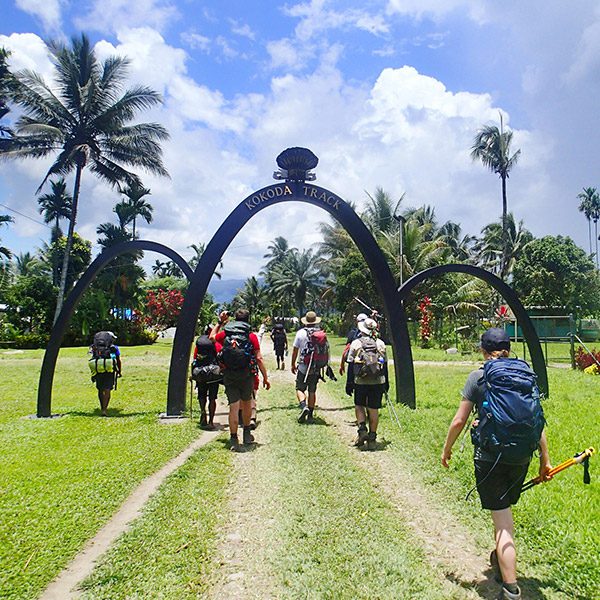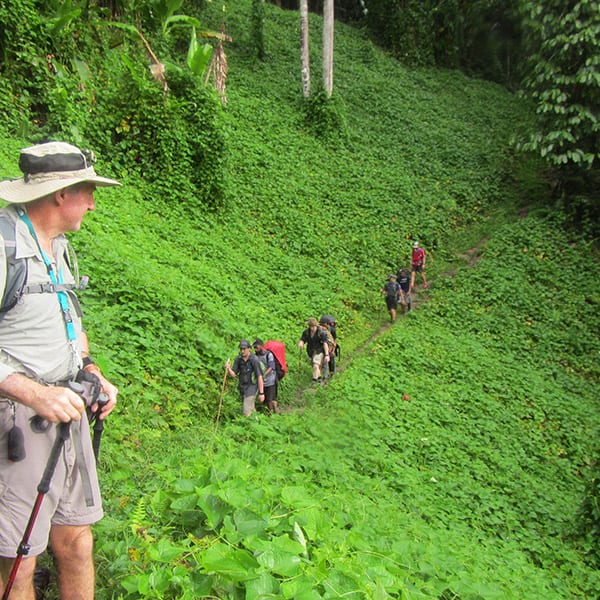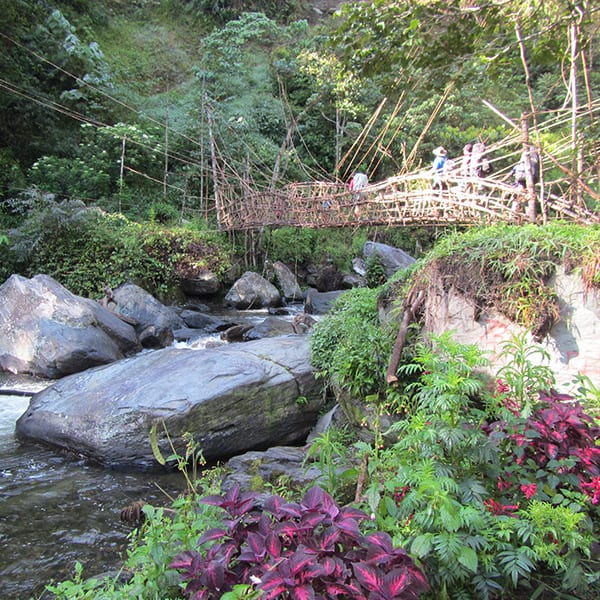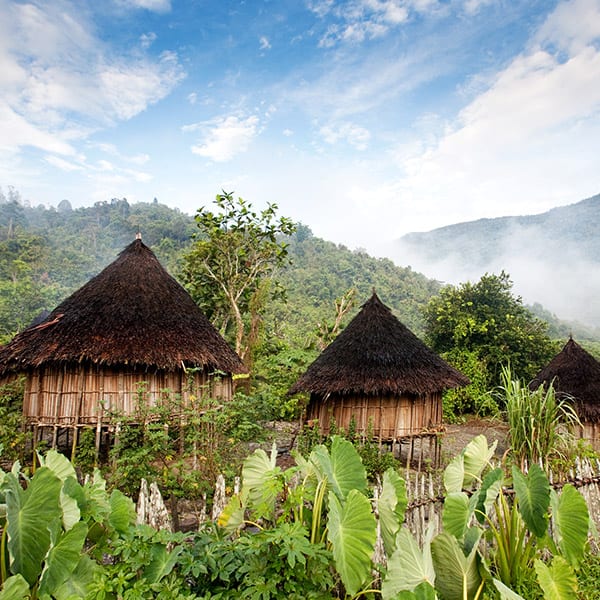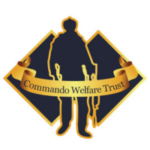Kokoda Track
Papua New Guinea
Trek through 96 kilometres (as the crow flies) of rugged mountain terrain, tropical rainforest and unspoiled villages on the legendary Kokoda Track.
Trip duration:
12 days
Challenge duration:
10 days
Challenge grade:
5/5
Departure months:
April to November
Accommodation:
Twin-share in 3-star motel and comfortable camping
Hiking the Kokoda Track
1942 saw the Kokoda Track as a scene of bitter fighting when the Australian Army fought to defend Port Moresby from advancing Japanese forces. Today, walking that same track has become an iconic pilgrimage for those wanting to honour the ANZAC spirit.
Regarded as one of the world’s greatest treks, the Kokoda Track links the south and north coast of Papua New Guinea across 96 kilometres (as the crow flies) of rocky mountain terrain, tropical rainforest and pristine villages.
On this inspiring adventure, you will trek the track by day, open to the unforgiving and inspiring beauty of Papua New Guinea’s tropical rainforest. As nightfall descends, you will stay in isolated camps, swapping stories with local Koiari and Orokaiva people and falling asleep to the nocturnal sounds of the jungle.
Best of all, you’ll make a difference to a cause you’re passionate about and meet like-minded people on this adventure of a lifetime. Get ready to find out why the Kokoda Track is considered one of the world’s great treks.
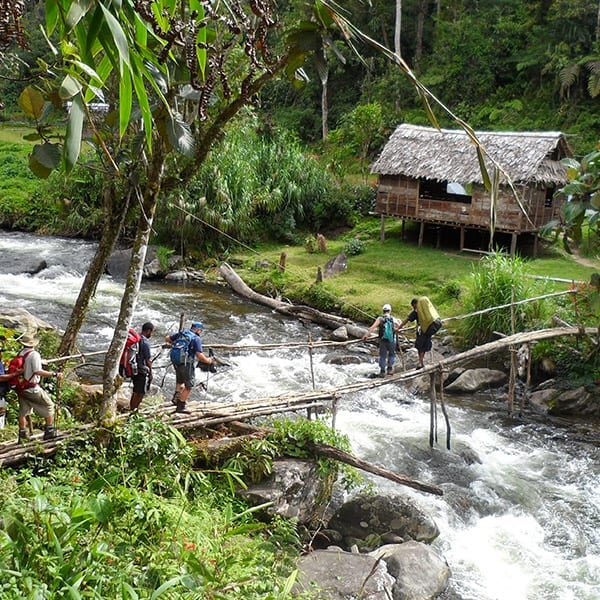
Why you'll love this adventure
- Trek through 96 kilometres of rugged mountain terrain, tropical rainforest and unspoiled villages of the legendary Kokoda Track
- Walk in the footsteps of Australian soldiers and learn about the history of the battle sites along the Track
- Discover the villages of the Papua New Guinea highlands, meet locals and experience firsthand the extraordinary cultures of this region
- Meet like-minded people and make a difference to a cause you are passionate about
Trip notes
Day 1: Arrive in Port Moresby
Note: This adventure is delivered by a licensed operator, Peak Learning Adventures.
Upon arrival in Port Moresby, make your way to the motel. There will be a representative in the arrivals hall who will show you to the shuttle bus. You’ll have the rest of the afternoon to relax and meet the guides and rest of the team.
Accommodation: Kokoda Trail Motel
Meals: D
Day 2: Preparation Day
In the morning, there will be a pre-trek briefing including an overview of the Kokoda campaign. This is followed by a demonstration of how to pack efficiently as well as a final gear check. There will be time to prepare ourselves for the days ahead, and then have the option of spending a relaxing afternoon sitting on the deck, or alternatively we have a swim in the beautiful Crystal Rapids.
Accommodation: Kokoda Trail Motel
Meals: B L D
Day 3: Owers Corner to Iriobaiwa Ridge
We have an early morning start, leaving the Hotel at 7.30 am for our drive to Owers Corner, the start point of the Track. We begin one of the world’s toughest treks by dropping down from the memorial arches at Owers Corner into the Goldie River some 40-minutes walk. After fording the river and passing Dump 66 we begin the climb to Imita Ridge. This is when our training and preparation will be tested as there are no shortcuts to the top. After descending Imita Ridge we follow the Ua’ula Creek system for a couple of hours before a climb half-way up Iriobaiwa Ridge to our campsite. The sunsets from this campsite are extraordinary.
Accommodation: Camping
Trekking distance: 14.8km
Meals: B L D
Day 4: Iriobaiwa Ridge to Nauro
We climb onto the top of Iriobaiwa ridge where we quickly come across the remnant gun pits of the furthest forward positions of the Japanese advance. From the upper slopes of the ridge we can see the coastline and pause to reflect on how tempting it must have been for the Japanese to make a dash to Port Moresby. But they obeyed the orders they received here and retreated. We have lunch at Ofi Creek before tackling the biggest challenge of the southern section of track, Maguli Ridge, rising to 1,338m. Our overnight stop is at the village of Nauro.
Accommodation: Camping
Trekking distance: 11.8km
Meals: B L D
Day 5: Nauro to Menari
We continue to descend to the ‘swamp’, a long walk through muddy and marshy terrain. This area was indefensible during the war so soldiers from both sides moved through here as quickly as possible. We will ford the Brown River and then make our way to the base of ‘the wall’, a tough climb of 400 vertical metres to Menari Gap. The grassy clearing at the top is a relief to the eyes. We are treated to great views of our track to Menari and Brigade Hill. A short descent takes us into the picturesque village of Menari. This was the location of the famous oration by LtCol Ralph Honner, the CO of the 39th Battalion where he commended his men on their bravery at Isurava.
Accommodation: Camping
Trekking distance: 9.7km
Meals: B L D
Day 6: Menari to Efogi Village
We commence our walk with a brief stop at the Menari Primary School next to the airstrip. We descend into the valley, cross a major stream and then climb solidly for over two hours onto Brigade Hill where we stop for lunch. Brigade Hill was the site of one of the major battles of the Kokoda campaign. The Japanese 42nd Regiment outsmarted the Australians in an audacious flanking manoeuvre. This threatened to overrun the Brigade Headquarters located to the rear of the three Infantry battalions. After paying our respects to the 99 fallen diggers, we trek on to Efogi Village, a wonderful overnight spot shaded by citrus trees, and a feast from our pre- arranged food drop and local fruit.
Accommodation: Camping
Trekking distance: 9.1km
Meals: B L D
Day 7: Efogi Village to Bombers Camp
Today’s trekking takes us through the grassy Naduri village, the highest on the Kokoda Track. After lunch, we trek past vegetable gardens and take in sweeping views of the Efogi valley and Kagi village before we move back into the canopy and trek through a striking pristine forest of ferns, huge split pandanas and rare orchids. We enjoy a short side trip to the smaller of the two flat Myola grasslands where in WW2 the ‘biscuit bombers’ dropped some of their loads. We camp in a forest glade near a crashed Mitchell bomber, a beautiful and serene campsite next to a refreshing mountain stream. A special evening activity gives us a memorable experience of what it must have been like for the soldiers to be out here.
Accommodation: Camping
Trekking distance: 11.9km
Meals: B L D
Day 8: Bombers Camp to Eora Creek
We head out from Bombers Camp for a side trip to the larger Myola 2 Lake. This extinct volcano was used as a makeshift airstrip, logistics dump and medical evacuation point. We then trek to Tin Shed and climb gently to the stunning forest clearing at Kokoda Gap, the high point of the track at 2,250m above sea level. We descend to Dump No 1 (also known as Templeton’s 1) for lunch. After lunch we trek to Templeton’s Crossing, then climb up a steep ridge before descending steadily past many Australian weapon pits to Eora Creek. Our campsite is located next to the thundering Eora Creek. This area has a fascinating wartime history with the first and second battles of Eora Creek. In the first battle, the Australians fought a rear-guard action during the withdrawal from Isurava. The second battle saw the Japanese resist the Australian advance for more than a week in late October 1942.
Accommodation: Camping
Trekking distance: 18.2km
Meals: B L D
Day 9: Eora Creek to Isurava Battlefield
The section we trek today is the location of four major battles between the Japanese and Australians, so we take time out to explore the terrain and the history. We visit the site of the Japanese gun position perched high above Eora Creek. Immediately we can see why it took the advancing Australians one week to take the position. We then traverse through Alola Village (with possibly the best passionfruit in the world), and on to Isurava Battlefield. Having walked the majority of the Kokoda Track, our respect for the efforts of the soldiers is much magnified by the time we get to the beautiful and atmospheric Isurava Battlefield. This was the scene of Private Bruce Kingsbury’s brave actions in 1942, for which he was awarded a Victoria Cross.
Accommodation: Camping
Trekking distance: 8.9km
Meals: B L D
Day 10: Isurava Battlefield to Kokoda Station
We commemorate the courage, endurance, mateship and sacrifice of those who fought and died on the Kokoda Track with a dawn service at the Kokoda Track Memorial at Isurava Battlefield. After breakfast we begin the last day, walking down through abandoned village gardens slowly reverting to jungle and overrun by choko vines. We have lunch at the picturesque village of Hoi (often full of flowers and fluttering butterflies) before walking on the wide flat track through cocoa, palm oil and rubber plantations to the large village of Kokoda. This marks the end of one of the world’s toughest treks. We will have climbed and descended over 6,500 metres. A terrific effort! A celebratory cool drink, pizzas and shower might be in order as we spend our last night at the track’s end.
Accommodation: Camping
Trekking distance: 16.3km
Meals: B L D
Day 11: Fly to Port Morseby
Our charter plane flies out of Kokoda at about mid-morning (as the weather and lifting cloud permit) and takes about 30 minutes to re-cross the Owen Stanley Ranges that has cost us all sweat and effort. It’s a great experience to spot the ridges and valleys of the Kokoda campaign and our own adventures on the track. Back in Port Moresby we pay a visit to Bomana War Cemetery where many of the Kokoda diggers are buried. After paying our last respects we transfer back to the tranquillity of Kokoda Trail Motel in good time for a shower and lunch. In the afternoon you may wish to spend some time relaxing, in the garden enjoying a cool drink or adding finishing touches to your diary before our celebration dinner.
Accommodation: Kokoda Trail Motel
Meals: B L D
Day 12: Depart Port Moresby
Transfer to the airport and depart Port Moresby to head home. When booking your return flight, avoid the early morning flight out of Port Moresby and aim for the early afternoon departure. The motel is located in the Hinterland and is a 45- minute drive to the airport and an early morning departure may require a 4 am wake-up plus the cost of a security escort (this is standard policy when driving at night with most hotels in PNG).
Meals: B
Day 1: Arrive in Port Moresby
Our adventure begins in the capital of Port Moresby with a welcome meeting tonight. An airport arrival transfer is included, so please speak with us to organise this no later than 30 days before your tour begins. Tonight we will have a briefing at 6pm to meet the rest of the team and guides.
Day 2: Port Moresby - Kokoda - Deniki
This morning take a short, spectacularly scenic chartered flight over the jungle canopies and craggy peaks of the Owen Stanley Range to the landing strip of Kokoda station. Kokoda, situated at 340 metres above sea level, is a hot and humid place, but there’s a nearby river to cool off in if we need. There is free time explore and visit the Kokoda Memorial and War Museum this morning before the trek begins, where we’ll learn a little more about Kokoda station. This spot held importance during WWII due to having the only airfield along the track, and the opening stages of the Kokoda Track campaign saw two battles take place in and around the village. Australian forces reoccupied Kokoda in November 1942 as the Japanese retreated to the north coast. After lunch, lace up and set off for the village of Deniki (4–5 hours). Begin with a flat walk through rows of palm oil and rubber tree plantations, passing through Kovelo and Hoi villages before the first steep ascent up the Owen Stanley Range. Deniki village is a historically significant location where the 39th Battalion first regrouped when Japanese forces occupied Kokoda. At 900 metres above sea level, we’ll be greeted with incredible views across the Kokoda Valley upon arrival, giving us the chance to pause and reflect on all that occurred here.
Trekking Distance: 14km
Meals: Breakfast, Lunch, Dinner
Day 3: Deniki - Isurava Village - Alola
Today will be our first full-day trek with an early start towards Isurava village. Pass through choko gardens planted by local villagers and by water holes where we can fill up our bottles. We will arrive at Isurava (1350 metres), a village relocated several times since WWII which now sits in a tranquil location with good access to water and sunshine. We continue to the famous Isurava battlefield and stop for a break to learn about the significance of the site. A powerful memorial built by the Australian Government features four pillars, reading ‘Courage, Sacrifice, Mateship and Endurance’, words we are sure to carry with us for the rest of our journey. Hear the story of the heroic Private Kingsbury, a real estate agent from Melbourne enlisted to fight in New Guinea. Kingsbury gallantly volunteered to clear a path through the enemy, allowing the Australian troops to regain their control, only to lose his life to a sniper’s bullet. Private Kingsbury’s courage earned him a posthumous Victoria Cross, and is one of many stories of unbelievable tragedy and bravery we will encounter on your journey. We continue to the village of Alola (at 1400 metres), which overlooks the Iora Valley and Auberi village, which is where we will spend the night.
Trekking Distance: 18km
Meals: Breakfast, Lunch, Dinner
Day 4: Alola - Templeton's Crossing - Lokobo
Our trek to Templeton’s Crossing today begins with a walk through lush rainforest and past creeks and rivers that feed directly out of mountain springs. Follow the hilly trail to Eora Creek, where the tranquil landscapes are in stark contrast to the two brutal battles that took place in 1942, resulting in the loss of many Australian lives. Take a break here to learn about the battles and perhaps freshen up in the river before continuing along the track. Three more hours of hiking will lead us to Templeton’s Crossing, the location of the Australian supply and storage facility during the war. Templeton’s Crossing also served as a burial ground for Australian soldiers lost during the Battle of Eora, and while the bodies were relocated at the end of the war, symbolic iron rods remain in the place of each soldier once buried at the site. Tonight will be spent at a cooperative guesthouse in Lokobo (at 1900 metres altitude).
Trekking Distance: 22km
Meals: Breakfast, Lunch, Dinner
Day 5: Lokobo - Mt Bellamy - Digger's Camp
This morning we rise for a tough day of trekking as we climb to a 2200-metre-high point on the flank of Mt Bellamy, also known as the Gap. Be sure to stay close to your personal porter while navigating the ascent. Take in some spectacular views across the Owen Stanley Ranges and descend a few hundred metres to your accommodation at Digger’s Camp. Set among lush rainforest, the village guesthouse is still around 2000 metres above sea level, so it can get very cold. Take a quick walk to the flat grasslands and creeks of Myola, a location that played a pivotal role in WWII, being used for supply drops and to tend to the sick and injured. The scattered remains of old aircrafts used to be seen around Myola, however these have since been salvaged by locals for scrap metal. Head back to Diggers' Camp and enjoy a dip in the river before dinner.
Trekking Distance: 18km
Meals: Breakfast, Lunch, Dinner
Day 6: Digger's Camp - Efogi I - Efogi II
Rise and shine and set off towards the northern face of Mt Bellamy, taking in views of the villages of Naduri, Kagi, Brigade Hill, and Nauro along the way. Make a 2-hour descent to Efogi I through open grassland and along steep, slippery trail, with a brief break en route in Naduri. Enjoy a well-deserved rest on arrival at Efogi I, a staging post where troops stopped overnight during their advance along the Kokoda Track. Keep some change handy so we can buy some of the organically grown fruit the locals sell. Continue the trek to Efogi II with a roughly 2-hour descent. While this leg of the trek is relatively short, it will take place in the middle of the day and the trail has no canopy protection, so we need to pace ourselves. Arrive in Efogi II, a Koiari village of around 500 inhabitants, and settle into our locally-owned cooperative accommodation.
Trekking Distance: 16km
Meals: Breakfast, Lunch, Dinner
Day 7: Efogi II - Brigade Hill - Menari
Embrace an early start this morning to trace the path taken by retreating Australian soldiers. The first climb takes us to Mission Ridge where we can turn and look back over Efogi I and II. Continue following the ridge towards Brigade Hill. Upon reaching Brigade Hill (approximately 1.5 hours), the trek leader will relate the wartime history of the spot where Australian forces were overwhelmed by fast-approaching Japanese troops. Hear how 20,000 soldiers marched down Mt Bellamy, their thousands of lanterns resembling a sea of fireflies to the Australian troops. This swift and efficient advance saw the Japanese take complete control of Brigade Hill in just a few days. Begin the descent down the back of Mission Ridge to Menari (approximately 2 hours) on a steep and sometimes very slippery track. Grab lunch and then set off again on a steep, 1.5-hour climb to the top of Menari Ridge. Enjoy the mental boost that comes with knowing we’ve ‘broken the back’ of the Kokoda Track, then make a descent to the Nauro Valley (approximately 1 hour). Cross the mighty Brown River to Nauro and cool off in a pleasant stream near our cooperative guesthouse accommodation near the original airstrip.
Trekking Distance: 22km
Meals: Breakfast, Lunch, Dinner
Day 8: Menari - Ioribaiwa - Uaule Creek
This morning we begin by tackling the Nine False Peaks to the top of Maguli Range (1350 metres). This involves roughly 3 hours of serious uphill trekking. From the top of the ridge, make the first of many descents today with a rest stop at Jap’s Ladder. Take another break at Ofi Creek and continue on to historic Ioribaiwa, situated at approximately 650 metres. It was here that the Japanese troops fought their final victorious battle against the Australians before withdrawing. From Ioribaiwa continue down a steep slope that leads to Uaule Creek. At the base of the Ioribaiwa Ridge make our way across a myriad of river and creek crossings (nine in total) until we reach Uaule Creek and set up camp for the night.
Trekking Distance: 24km
Meals: Breakfast, Lunch, Dinner
Day 9: Uaule Creek - Owers Corner - Port Moresby
Our journey today starts across multiple river crossings along Uaule Creek. Come prepared with sandals or expect wet boots. Continue with a trek up the back of Imita Ridge for about 1.5 hours. From here, trek down a trail once known as the Golden Staircase, built by Australian troops during the war to transport artillery and supplies from Port Moresby. Take a break at the summit of Imita Ridge then descend to Goodwater. Continue to Goldie River (3 hours), then make the final climb to Owers Corner. Congratulations! We can now officially say we have completed the Kokoda Track! We will meet with our driver and transfer back to Port Moresby, stopping en route to visit Bomana War Cemetery, where 3600 Australian soldiers were laid to rest. This evening perhaps grab a well-deserved drink with your team and fellow trekkers. Cheers!
Trekking Distance: 15km
Meals: Breakfast, Lunch, Dinner
Day 10: Depart Port Moresby
Our adventure has come to an end. Check out of the hotel is at 11 am and transfer to the airport can be organised on request. Just let us know your flight details 30 days prior to adventure departure date.
Meals: Breakfast
Frequently asked questions
Can't find the answer to your question? Get in touch via email (info@inspiredadventure.com.au
About the adventure
How challenging is this adventure?
This adventure is ranked 5/5. The Kokoda Track involves trekking for eight days in remote areas for up to eight hours a day (possibly more, subject to weather conditions).
While no extensive trekking experience is required prior to registering, our adventures are specifically designed for people who are relatively fit and willing to train. The Kokoda trek is a physical challenge, and the fitter you are, the more you will enjoy the experience.
Who will I be travelling with?
Our average group size at Inspired Adventures ranges from 10 to 20 people. You can be sure that you have all come together with the shared purpose of making a difference to others and having the adventure of a lifetime.
The group will be led by a local tour guide with expert knowledge of the region. Many groups will also be accompanied by an Inspired Adventures team leader or doctor to support and motivate the team.
Where applicable, a charity representative may also join the team. This is a wonderful opportunity to learn more about your chosen charity and their work.
Can I join an Inspired Adventure on my own?
Of course, most people do! Throughout your adventure journey, we will connect you with your fellow adventurers so you can get to know each other before you hit the road.
What is the general age range of participants?
The minimum age for this adventure is 18, however younger ages are considered on application. We have had participants aged 16–84 take part in our challenges, all united by their sense of philanthropy and adventure.
Fitness and training
How do I train for this adventure?
Training for the Kokoda Track should not be taken lightly. We have prepared a special training guide specifically for Kokoda adventures with detailed suggestions, which you will be sent after registering. Our best training advice is the same for all adventures: start early, increase gradually and be consistent.
We recommend that you consult your GP and a personal trainer to develop a training plan that will prepare you for the challenge.
In addition to your physical training, it’s important to be mentally prepared for the challenge. You might encounter setbacks and difficult periods during the trek, but remind yourself that many people have achieved this feat before you, and you can do it too. Maintain a positive attitude, and remember your guide will be there to encourage and inspire you all the way!
Do I need to carry my own pack?
Due to the challenging nature of this trek, porters are included in your travel cost and will carry your large packs. We ask you keep your large packs under 12kg as the porters also need to carry other equipment. You will still be required to carry a daypack with water, snacks, extra clothing, personal medications and anything else you may need for the day’s trek.
Accommodation
What is the accommodation like?
Accommodation on this adventure is twin-share in a 4-star hotel in Port Moresby. While camping, you will have a twin-size tent for individual use.
Will I be sharing accommodation?
Accommodation in Port Moresby is based on twin-share (you will have your own tent while trekking). You will be paired with a teammate of the same gender and, whenever possible, age group. Single rooms are available at an additional cost and subject to availability.
I’m travelling with a friend, can we stay together?
Absolutely! If you’re travelling with a friend, please make note of this and we will pair you together.
What to expect
What are the toilets like?
The hotel will have western amenities with water and flushing toilets. While trekking, toilets are primarily basic squat-style or in the bush. When using these toilets, toilet paper should be placed in the bins provided or in a recyclable brown paper bag to be disposed of later. You should bring hand sanitiser and your own toilet roll.
Are showers available?
Bathing will typically mean a cold shower or a wash in the river near the village.
What is the food like?
While out on the Track, food will be provided by your local team. Sit back, relax, and they’ll prepare everything you need. While the food won’t be gourmet, you’ll be treated to a variety of freshly prepared, hearty meals.
Breakfast typically consists of tea/coffee/milo, porridge, cereals and fresh fruit when available.
Lunch includes noodles, soups, biscuits, mountain bread, cheese, salami, and tuna, along with tea and coffee.
Dinner is prepared each night by the head cook and features both meat and vegetarian dishes. Dinners include pasta with sauce, fried rice, curries, casseroles, crackers and pappadums.
I have dietary requirements, will I be catered for?
Of course, we will happily arrange for any dietary requirements you’ve noted during booking to be catered for. Please advise your local guide and Team Leader on Day 1 as well.
Will I have mobile phone reception?
Mobile coverage is very limited along the Kokoda Track and regular signal should not be expected. If you wish, you may like to purchase a local sim card or check with your service provider regarding worldwide coverage for the few opportunities during which you may be in range.
The head guide will have a satellite phone, however this is only available for use in the case of an emergency.
Will I have access to electricity?
Papua New Guinea uses outlet type I, as in Australia and New Zealand.
While trekking, you will not have access to electricity. We recommend bringing a powerbank (portable charger), which you can charge before embarking on the trek to be used to charge any devices.
What do I need to pack?
You will be sent a comprehensive packing list after you register for the adventure with everything you need to consider.
What happens if there is a medical emergency?
Providing the safest possible environment is our highest priority and we have an outstanding safety record. All Inspired Adventures guides and Team Leaders are first aid trained. Our guides carry satellite phones to be used if further assistance is required.
Costs and payments
What’s included in the travel cost?
Package inclusions vary from trip to trip so please refer to the specific trip notes for details.
Generally, the travel cost includes:
- Flight from Port Moresby to Popondetta as per itinerary
- All land transfers as per itinerary in private vehicles
- Twin-share accommodation in 4-star hotel and comfortable camping with single occupancy
- Professional Australian trek leader, local head guide and trekking crew
- All camping gear (excluding sleeping bag, sleeping mat and pillow) including tents, emergency equipment
- All meals as per itinerary
- Water on trekking days
- All entrance fees and permits as per itinerary
What’s not included in the travel cost?
Package exclusions vary from trip to trip so please refer to the specific trip notes.
Generally, the travel cost does not include:
- International airfares
- Travel insurance (compulsory)
- Visa
- Vaccinations
- Personal guide cost and backpack
- Expenditure of a personal nature
- Tips and gratuities
Is the travel cost guaranteed?
We will do our best to keep the travel costs as quoted. However, please bear in mind they can change due to group size, currency fluctuations or factors out of our control. If absolutely necessary, Inspired Travel may have to add on an additional supplement fee should the current social distancing measures continue. This fee would be required if our operator needs to add on additional vehicles, equipment and/or staff.
How much spending money do I need?
Shopping is extremely limited while trekking though there will be a few occasions where the local villages will set up a market for the team. We recommend you allow 30-45 Kina (approximately $15-22 AUD) per day to cover any additional purchases you may wish to make while trekking, such as snacks or Billum bags to support the local communities.
Is it customary to tip?
While tipping is an accepted part of the tourism industry in Papua New Guinea, you are encouraged to tip only an amount you find appropriate. The customary tipping amount is 80 Kina in total if you do not hire a personal guide. If you choose to hire a personal guide, it is recommended to budget 100 Kina in addition for the personal guide (180 Kina total).
Travel insurance and visas
Do I need to have travel insurance?
Travel insurance is compulsory for international adventures to cover cancellation, hospital, emergency evacuation and lost luggage. We recommend purchasing your policy as soon as possible. It is up to you to ensure you have fully comprehensive travel insurance and you will need to share these details with our team before departure. For more information, please visit www.inspiredadventures.com.au/travel-insurance-information.
Do I need a visa to travel to Papua New Guinea?
Australian and New Zealand passport holders require a visa for entry into Papua New Guinea.
Passports are required to be valid for at least six months after the date you return to your home country. You must have a valid passport before you can apply for a visa.
About Papua New Guinea
What weather can I expect?
Trekking season on the Kokoda Track typically runs from April through November to avoid the rainy season in Papua New Guinea. That said, heavy rainfall and muddy conditions should be expected at all times of the year. Temperatures typically range from 24-32°C during the day, reaching as low as 5-10°C at night. Humidity levels are very high around 80-95%.
Please check local forecasts in the weeks leading up to your adventure for up-to-date weather information.
Is it safe to travel to Papua New Guinea?
While in Papua New Guinea, we advise you to be aware of your surroundings at all times. Never leave your belongings unattended, always maintain eye contact or a firm grip on cameras and shoulder bags and avoid travelling alone, especially at night.
Caution should be adopted in Port Moresby, where we recommend you remain at your hotel. While trekking, it is important that you listen to the advice given by your local guides regarding responsible and safe behaviour.
For the latest information regarding travel to Papua New Guinea, please visit the Smartraveller website.
Can I drink the water in Papua New Guinea?
You will fill up with water from the creeks everyday, but the water needs to be purified with water purification tablets or other purification devices before drinking.
Do I require any vaccinations to travel to Papua New Guinea?
The most common vaccinations required are polio, hepatitis A and B, typhoid, and tetanus and diphtheria. Consult with your GP to discuss your needs.
About the adventure
How challenging is this adventure?
This adventure is ranked 5/5. The Kokoda Track involves trekking for eight days in remote areas for up to eight hours a day (possibly more, subject to weather conditions).
While no extensive trekking experience is required prior to registering, our adventures are specifically designed for people who are relatively fit and willing to train. The Kokoda trek is a physical challenge, and the fitter you are, the more you will enjoy the experience.
Who will I be travelling with?
Our average group size at Inspired Adventures ranges from 10 to 20 people. You can be sure that you have all come together with the shared purpose of making a difference to others and having the adventure of a lifetime.
The group will be led by a local tour guide with expert knowledge of the region. Many groups will also be accompanied by an Inspired Adventures team leader or doctor to support and motivate the team.
Where applicable, a charity representative may also join the team. This is a wonderful opportunity to learn more about your chosen charity and their work.
Can I join an Inspired Adventure on my own?
Of course, most people do! Throughout your adventure journey, we will connect you with your fellow adventurers so you can get to know each other before you hit the road.
What is the general age range of participants?
The minimum age for this adventure is 18, however younger ages are considered on application. We have had participants aged 16–84 take part in our challenges, all united by their sense of philanthropy and adventure.
Fitness and training
How do I train for this adventure?
Training for the Kokoda Track should not be taken lightly. We have prepared a special training guide specifically for Kokoda adventures with detailed suggestions, which you will be sent after registering. Our best training advice is the same for all adventures: start early, increase gradually and be consistent.
We recommend that you consult your GP and a personal trainer to develop a training plan that will prepare you for the challenge.
In addition to your physical training, it’s important to be mentally prepared for the challenge. You might encounter setbacks and difficult periods during the trek, but remind yourself that many people have achieved this feat before you, and you can do it too. Maintain a positive attitude, and remember your guide will be there to encourage and inspire you all the way!
Do I need to carry my own pack?
Due to the challenging nature of this trek, porters are included in your travel cost and will carry your large packs. We ask you keep your large packs under 12kg as the porters also need to carry other equipment. You will still be required to carry a daypack with water, snacks, extra clothing, personal medications and anything else you may need for the day’s trek.
Accommodation
What is the accommodation like?
Accommodation on this adventure is twin-share in a 3-star hotel in Port Moresby. While camping, you will have a twin-share tents.
Will I be sharing accommodation?
Accommodation in Port Moresby and camping on the trail is based on twin-share). You will be paired with a teammate of the same gender and, whenever possible, age group. Single rooms are available at an additional cost and subject to availability.
I’m travelling with a friend, can we stay together?
Absolutely! If you’re travelling with a friend, please make note of this and we will pair you together.
What to expect
What are the toilets like?
The hotel will have western amenities with water and flushing toilets. While trekking, toilets are primarily basic squat-style or in the bush. When using these toilets, toilet paper should be placed in the bins provided or in a recyclable brown paper bag to be disposed of later. You should bring hand sanitiser and your own toilet roll.
Are showers available?
Bathing will typically mean a cold shower or a wash in the river near the village.
What is the food like?
While out on the Track, food will be provided by your local team. Sit back, relax, and they’ll prepare everything you need. While the food won’t be gourmet, you’ll be treated to a variety of freshly prepared, hearty meals.
Breakfast typically consists of tea/coffee/milo, porridge, cereals and fresh fruit when available.
Lunch includes noodles, soups, biscuits, mountain bread, cheese, salami, and tuna, along with tea and coffee.
Dinner is prepared each night by the head cook and features both meat and vegetarian dishes. Dinners include pasta with sauce, fried rice, curries, casseroles, crackers and pappadums.
I have dietary requirements, will I be catered for?
Of course, we will happily arrange for any dietary requirements you’ve noted during booking to be catered for. Please advise your local guide and Team Leader on Day 1 as well.
Will I have mobile phone reception?
Mobile coverage is very limited along the Kokoda Track and regular signal should not be expected. If you wish, you may like to purchase a local sim card or check with your service provider regarding worldwide coverage for the few opportunities during which you may be in range.
The head guide will have a satellite phone, however this is only available for use in the case of an emergency.
Will I have access to electricity?
Papua New Guinea uses outlet type I, as in Australia and New Zealand.
While trekking, you will not have access to electricity. We recommend bringing a powerbank (portable charger), which you can charge before embarking on the trek to be used to charge any devices.
What do I need to pack?
You will be sent a comprehensive packing list after you register for the adventure with everything you need to consider.
What happens if there is a medical emergency?
Providing the safest possible environment is our highest priority and we have an outstanding safety record. All Inspired Adventures guides and Team Leaders are first aid trained. Our guides carry satellite phones to be used if further assistance is required.
Costs and payments
What’s included in the travel cost?
Package inclusions vary from trip to trip so please refer to the specific trip notes for details.
Generally, the travel cost includes:
- Flight from Port Moresby to Popondetta as per itinerary
- All land transfers as per itinerary in private vehicles
- Twin-share accommodation in 4-star hotel and comfortable camping with single occupancy
- Professional Australian trek leader, local head guide and trekking crew
- All camping gear (excluding sleeping bag, sleeping mat and pillow) including tents, emergency equipment
- All meals as per itinerary
- Water on trekking days
- All entrance fees and permits as per itinerary
What’s not included in the travel cost?
Package exclusions vary from trip to trip so please refer to the specific trip notes.
Generally, the travel cost does not include:
- International airfares
- Travel insurance (compulsory)
- Visa
- Vaccinations
- Personal guide cost and backpack
- Expenditure of a personal nature
- Tips and gratuities
Is the travel cost guaranteed?
We will do our best to keep the travel costs as quoted. However, please bear in mind they can change due to group size, currency fluctuations or factors out of our control. If absolutely necessary, Inspired Travel may have to add on an additional supplement fee should the current social distancing measures continue. This fee would be required if our operator needs to add on additional vehicles, equipment and/or staff.
How much spending money do I need?
Shopping is extremely limited while trekking though there will be a few occasions where the local villages will set up a market for the team. We recommend you allow 30-45 Kina (approximately $15-22 AUD) per day to cover any additional purchases you may wish to make while trekking, such as snacks or Billum bags to support the local communities.
Is it customary to tip?
While tipping is an accepted part of the tourism industry in Papua New Guinea, you are encouraged to tip only an amount you find appropriate. The customary tipping amount is 80 Kina in total if you do not hire a personal guide. If you choose to hire a personal guide, it is recommended to budget 100 Kina in addition for the personal guide (180 Kina total).
Travel insurance and visas
Do I need to have travel insurance?
Travel insurance is compulsory for international adventures to cover cancellation, hospital, emergency evacuation and lost luggage. We recommend purchasing your policy as soon as possible. It is up to you to ensure you have fully comprehensive travel insurance and you will need to share these details with our team before departure. For more information, please visit www.inspiredadventures.com.au/travel-insurance-information.
Do I need a visa to travel to Papua New Guinea?
Australian and New Zealand passport holders require a visa for entry into Papua New Guinea.
Passports are required to be valid for at least six months after the date you return to your home country. You must have a valid passport before you can apply for a visa.
About Papua New Guinea
What weather can I expect?
Trekking season on the Kokoda Track typically runs from April through November to avoid the rainy season in Papua New Guinea. That said, heavy rainfall and muddy conditions should be expected at all times of the year. Temperatures typically range from 24-32°C during the day, reaching as low as 5-10°C at night. Humidity levels are very high around 80-95%.
Please check local forecasts in the weeks leading up to your adventure for up-to-date weather information.
Is it safe to travel to Papua New Guinea?
While in Papua New Guinea, we advise you to be aware of your surroundings at all times. Never leave your belongings unattended, always maintain eye contact or a firm grip on cameras and shoulder bags and avoid travelling alone, especially at night.
Caution should be adopted in Port Moresby, where we recommend you remain at your hotel. While trekking, it is important that you listen to the advice given by your local guides regarding responsible and safe behaviour.
For the latest information regarding travel to Papua New Guinea, please visit the Smartraveller website.
Can I drink the water in Papua New Guinea?
You will fill up with water from the creeks everyday, but the water needs to be purified with water purification tablets or other purification devices before drinking.
Do I require any vaccinations to travel to [Insert destination name]?
The most common vaccinations required are polio, hepatitis A and B, typhoid, and tetanus and diphtheria. Consult with your GP to discuss your needs.
All information is subject to change and will be confirmed upon your registration.
Reviews
★★★★★
“Thank you for organising this trip - working with a locally owned Kokoda track company was amazing and made it more special.”
Amanda
★★★★★
“It was an amazing experience and something that I will remember fondly for a long time.”
Peter
★★★★★
“Raising money to help people in need helped me with the determination I needed to take on the great challenges that life can bring, like the Kokoda Track.”
Mary Kelly
★★★★★
“It made me appreciate that the Australian soldiers were remarkable under the circumstances.”
John Maag
Responsible Travel
Caring for our adventurers, the communities we visit and the wellbeing of the planet is the heart of everything we do. This adventure is no exception.
Meaningful connections: Hear from Aranda Elders who will tell us about the history of the area.
Environment: We offset the emissions from this trip through carbon credit programs in partnership with Carbon Neutral.
Treading lightly: Trekking is a great, low-impact way to explore.
Small group travel: Our teams consist of a maximum of 25 people. Better for you, and better for the planet.
Responsible business: We’re a certified B-Corp, committed to using business as a force for good
Upcoming adventures
Commando Welfare Trust – Kokoda Anzac Trek
Legacy – Kokoda Trek
Do you want to take your supporters on an adventure-of-a-lifetime?
Enquire today about an itinerary for your organisation.
Thank you!


